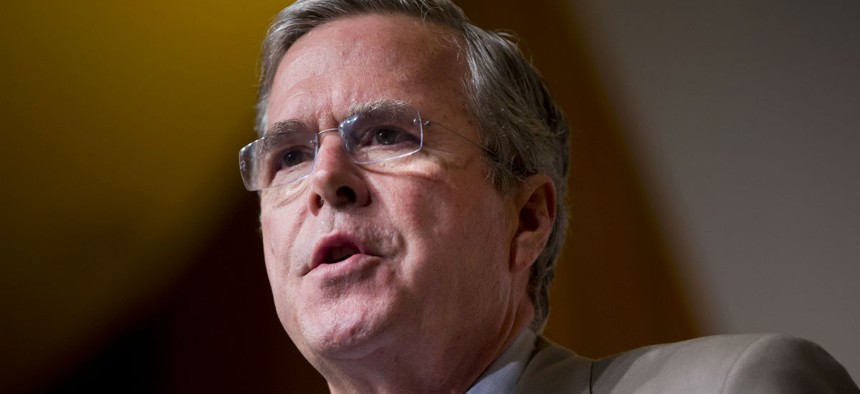Bush Lays Out Post-Obamacare Plan for the GOP
Many of the features of the Affordable Care Act come from a plan drafted by the conservative Heritage Foundation.
As most of the Republican presidential candidates join in the same Obamacare-bashing chorus, late entrant Jeb Bush seems to be on a different page, perhaps a different hymnal entirely.
With a major Supreme Court ruling on the Affordable Care Act expected by the end of the month,Bush recently wandered away from the GOP harmony by pointing out that the health insurance exchanges at the heart of the court case were originally "a Republican idea."
In an interview with The Des Moines Register following his formal announcement as a candidate last week, Bush noted that the concept was two decades old. "They were first conceived as an alternative to Hillarycare," he said.
Bush, who typically answers every question he is asked, did not respond to a National Journalquery on the topic during his Washington visit last week.
In the Iowa newspaper interview, though, he made his pitch for what congressional Republican leaders should do if the court sides with the law's conservative challengers and invalidates subsidies in states that don't have exchanges. Bush sees it as an opportunity to pass legislation giving "broad discretion to states to create exchanges that would look more like a Republican vision of how you expand access to health care insurance."
"The president's likely to veto that. You don't know until you get it there, though," he told theRegister.
The Supreme Court could rule as early as this week in King vs. Burwell, which challenges the Obama administration's decision to permit residents in the 34 states without a state-run exchange to receive tax credits to buy insurance through the federally managedHealthCare.gov website. Most Republicans have sided with the plaintiffs in the case, even though well over half of the 6.4 million people who would lose the subsidies are white and from the South—the heart of the modern Republican Party.
Bush's comments also raise an uncomfortable fact for Republicans: Many features of the Affordable Care Act, including the much-reviled "individual mandate" requiring most Americans to purchase health insurance, come from a plan drafted by the conservative Heritage Foundation, on whose board Bush once served.
The 1989 plan was titled "Assuring Affordable Health Care for All Americans," and began with this premise: "All citizens should be guaranteed universal access to affordable health care."
It included such ideas as expanding Medicaid, breaking the link between health insurance and the employer, creating a system of tax credit subsidies to pay premiums, and allowing older children to remain on parents' policies.
The Heritage plan justified requiring all Americans to buy insurance by pointing out that society was already on the hook for health-care costs of the uninsured. "If a man is struck down by a heart attack in the street, Americans will care for him whether or not he has insurance. If we find that he has spent his money on other things rather than insurance, we may be angry but we will not deny him services—even if that means more prudent citizens end up paying the tab," the plan stated. "A mandate on individuals recognizes this implicit contract."
Some of the concepts were included in a Republican alternative to then-first lady Hillary Clinton's push for universal health care in 1993. A decade and a half later, centrist Democrats and the Obama administration signed onto much of the plan as the basis for the Affordable Care Act. They believed that, because of its origins, Republicans would be more likely to go along with it.
But Republicans have been almost-uniform in their opposition to the law, both during its consideration and in the five years since its passage. The dozen declared 2016 GOP presidential candidates have similarly shared the goal of undoing President Obama's signature achievement.
Bush himself has called the law a "monstrosity" and "flawed to its core"—but also has said that Republicans must come up with a workable alternative.







